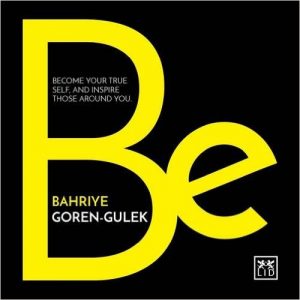Be Excerpt
 Guest post by Bahriye Goren-Gulek
Guest post by Bahriye Goren-Gulek
What is it about certain individuals that inspire not only themselves but also the people around them? In her recent book, Be: Become Your True Self, And Inspire Those Around You, author and branding expert Bahriye Goren-Gulek explores that certain sense of being that comes with deeper levels of awareness — which ultimately turns ordinary leaders into inspiring leaders.
Her book highlights eight concepts that readers can use to help them on the path to reaching deeper levels of awareness. Each chapter ends with an interview with a leading business professional who, according to the author, has learned how to bring that specific concept to life. Below, the author has shared an excerpt from Chapter 1, titled “Intuition.”
*****
The stories we tell ourselves:
As human beings we are known to be notorious storytellers. Our whole life experience is based on the stories we tell ourselves. Think about it. Isn’t every experience you recall a personal commentary, a thought, a perception, even an interpretation of occurrences? Two people can attend the exact same concert yet have two completely different thoughts about it and, as a result, two totally different stories to tell afterwards. You probably describe the last company outing very differently than some of your colleagues or team members might describe it. And what happens when we add the opinions and expectations of people around us to our own thoughts? The mixture of all these thoughts and opinions becomes our story and description of who we are, or who we think we are. Our thoughts create our stories, which in turn create our life – or rather, it creates how we experience our life.
In essence, our characters and personalities are a result of the stories we create about ourselves, as well as the people that influence us, especially at a younger age. I don’t want to go too deeply into this as it could be a topic for a separate book, but the ancient Chinese philosopher Lao Tzu summed it up perfectly when he wrote: “Watch your thoughts; they become words. Watch your words; they become actions. Watch your actions; they become habits. Watch your habits; they become character. Watch your character; it becomes your destiny.”
The thoughts and words Lao Tzu refers to are literally the stories we tell ourselves and others, over and over again. So then, how exactly does this relate to intuition? In essence: our fears and desires are a direct result of the stories we tell ourselves, and in turn these stories reinforce our fears and desires, and the vicious cycle begins. As a child, you weren’t scared to speak your mind. And yet, over time, you got conditioned to sometimes bite your tongue. You might have been humiliated (or felt humiliated) when you spoke up and people reacted adversely, so the story you told yourself was that when you speak up in certain situations, you get ‘punished’, which turned you somewhat introverted. As David Lynch (director and screenwriter) pointed out so eloquently: “We think we understand the rules when we become adults but what we really experience is a narrowing of the imagination.”
This same principle applies to the workplace. I’ve worked in environments where people are governed by fear. And guess what? Most likely, the leaders in those workplaces have many fears within themselves. We all know the insecure overachiever profile. I was even recruited by one of my first employers because I was one of them. But when an insecure overachiever gets to be in charge, they will demand the same work ethic from the people who work for them. I can guarantee you fear is never the best adviser.
The first time I became a leader, I wasn’t leading with awareness at all, and it was reflected in how my team was operating. I didn’t realize a lot of my words and actions were driven by my own insecurities, and it resulted in my team behaving in the same way. Fear makes people shut down, and nothing is more detrimental to creativity than fear. The point here is clear: people around us mirror who we are and what we radiate. If we are mindful and at peace, the people we lead will become more mindful and more at peace. Professor Mark Beeman, who specializes in cognitive neuroscience at Northwestern University, has conducted one of the most groundbreaking studies on insights and where creative problem-solving comes from. He
has shown different patterns of brain activity in high-insight versus low-insight anagram solvers, when people are completely at rest. The key conclusion was that insights do not come from logical reasoning, but are a sudden knowing that pops up in a restful state. They emerge out of a moment of nothingness. They emerge from what I would call intuition.
So how do we tune into this magical source called intuition? It is actually simpler than you might think, yet at the same time, its simplicity is also one of the hardest things to achieve, especially in our digitally ‘always on’ society.
First of all, it’s important to realize that your intuition is already present. It’s inside of you, so you don’t need to go anywhere or do anything! I have participated in many corporate and self-help training programmes out there, seeking tools to become a better person. Drumming sessions to build better teams and drum out the frustrations? Why not? Phrases like ‘limiting beliefs’ and ‘growing edge’ are thrown at you from all directions. I’ve seen colleagues break down, weeping, in some of these workshops, because they feel lost.
It was only after I took a break from going to these workshops that I could see what the main learning point was. The key is to remove the barriers we have put in place, versus searching to find that holy grail as if it is something outside of us. Over the years, we have become so skilled at protecting ourselves, our image, our status, that in the process we have also killed that which makes us the best leaders: our inner wisdom. We have become externally driven versus internally driven. You must recall those moments where you feel this tinkling in your gut. When all of a sudden you get an idea, or you are interviewing someone for a job and you know that it’s a bull’s eye. You just know it!
So how to bring back what we seem to have lost?
You get your intuition back when you make space for it, when you are able to silence the mind. The word ‘mindfulness’ has become extremely popular these days, giving it both a mystical as well as an unreachable status. Nothing could be further from the truth. It basically comes down to being able to stop thinking, stop talking, stop doing, and listen. Still the rational mind. The mind that society has put on a pedestal, where we think we can outsmart life. But the fact of the matter is that the rational mind doesn’t know everything. And, often, it can hinder us to find the right answers.
I challenge you to take 10-15 minutes of silence every day. Alone. Just switch off your phone, your laptop. And don’t switch on the TV or radio either. Sit still, even if it feels uncomfortable or boring at first, close your eyes and just focus on your breath. If you are having a hard time sitting still, you can also take a walk while doing this. The key is to not interact, not think back over things that happened or things that you want to do. Just be. Of course, thoughts will
come up. Let them. Don’t resist. Just keep being still, whether by sitting still or
while in motion. Be still.
Be: Become Your True Self, And Inspire Those Around You by Bahriye Goren-Gulek is available in both Kindle and Paperback version via Amazon.
About the Author
 In her recent book, Be: Become Your True Self, And Inspire Those Around You, author Bahriye Goren-Gulek draws on her 15 years of global experience as a brand strategy expert to inspire readers to achieve deeper levels of awareness in order to transform ordinary leadership into extraordinary leadership.
In her recent book, Be: Become Your True Self, And Inspire Those Around You, author Bahriye Goren-Gulek draws on her 15 years of global experience as a brand strategy expert to inspire readers to achieve deeper levels of awareness in order to transform ordinary leadership into extraordinary leadership.
A seasoned brand strategist, Goren-Gulek has worked on both the client (Unilever) and agency side where she has consulted world class multinationals across the globe. As the former Executive Director of Innovation and Strategy at Wallace Church & Co., an award winning branding agency in New York, she has worked with the most talented creative and brand leaders. She is a university lecturer at the graduate and undergraduate level at business schools in New York, Colorado, Singapore and Taiwan. She lives with her husband, son and their dog in Boulder, Colorado.









